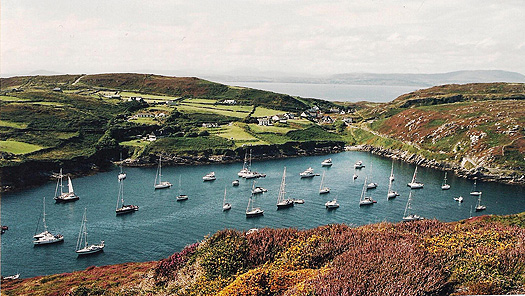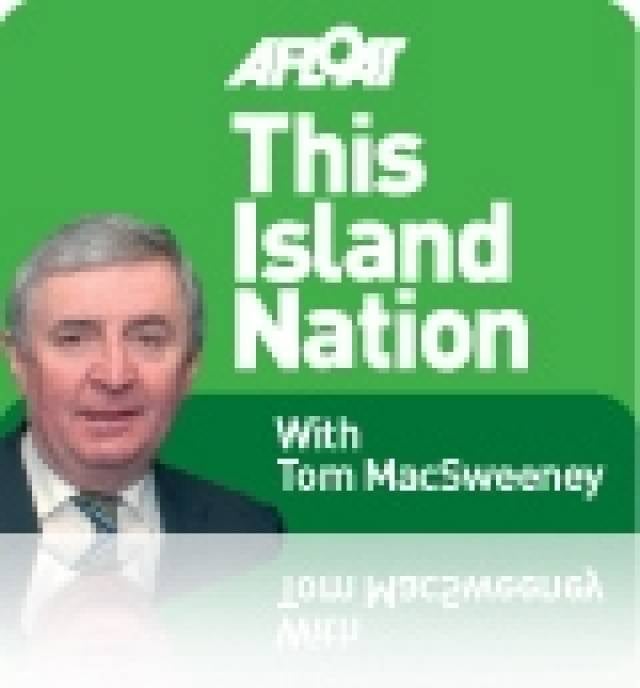#islandnation – This week in THIS ISLAND NATION – health in Cork Harbour, sea bass and Irish fishermen, shipping unions take unusual action, where have the Puffins gone, rogue waves and much more...
Cork Harbour is a great local and national resource, generally regarded as the second biggest, best and most beautiful natural harbour in the world. I say that not just as a Corkman living in the harbour area, but because it is generally accepted.
There have been and remain several environmental battles on-going about the harbour involving development proposals by the semi-State Cork Port Company and for a national toxic incinerator and added to all of this Cork Harbour is the location of perhaps the biggest environmental problem Ireland has to resolve - the dumps of waste left behind by the former Irish Steel company on Haulbowline Island, alongside which the Naval Service is based.
The Government's lethargy in dealing with this problem after twelve years of reports warning about dangers to human health is disgraceful. When is work going to start on the remediation of Haulbowline Island in Cork Harbour, is a question I have been asked following public information meetings held by Cork County Council about the matter. It seems that anyone who expects to see work get underway in the near future on the proposed 'capping' of the East Waste Tip on the island, at a cost of €40m., will be disappointed. That proposal was in response to a Government request, but there are other areas of concern on the island and there is no firm indication that the State has any plans to deal with them. They are the site where the main steelworks stood and the South Tip. I have been given to understand that it could take over a year before even a waste licence is obtained to allow the Council undertake any remedial work on the East Tip.
Checking previous investigations about Haulbowline, there is a 2001 report which warned that there was a high risk to humans from PCB spills and to the marine environment from metals and high to moderate risks to humans from windblown-dust. These were just some amongst the predicted dangers highlighted by environmental consultants.
Twelve years later the Government has still not acted and by failing to do so its concern for the people who live and work in Cork Harbour in the vicinity of the former plant is open to challenge. Cork County Council has indicated its concern about the situation and awareness of contaminant issues pertaining to the site but has made clear that it does not own the site and does not have direct authority to intervene.
It is time for the Government to show more concern for the health of the people of Cork Harbour.
Fishing – FOREIGN VESSELS CAN CATCH BASS IN IRISH WATERS – BUT NOT IRISH FISHERMEN
Next June the EU Fisheries Commission is proposing to issue Total Allowable Catches for sea bass, based on the fishing track records of EU fishing nations.
Irish fishermen are unlikely to be given any quota because our Government has banned fishing for bass in Irish waters, even though British and French vessels are allowed to catch bass in Irish waters and land them into Irish ports!
This has been described as "a national self-inflicted scandal" by the Federation of Irish Fishermen which represents the country's fishing organisations. The TACs will be granted on the basis of fishing for bass in the years 2000 to 2010 and Ireland has no record as the Government banned commercial fishing for this species in the mid-90s. This was under pressure from angling interests and to protect the species. The Irish ban did not apply to foreign vessels in Irish waters.
"This is a cause of intense anger and frustration for the Irish fishing industry," said the FIF. "Other EU Member States can fish, catch and land sea bass, even into Irish ports, while Irish fishermen are prevented from catching the fish by an Irish Government decision."
The FIF has been asking for the fishery to be re-opened for several years, with a specific proposal which would have allowed a fishery over 30 miles off the South East Coast in order not to interfere with recreational angling.
"This is a self-inflicted disaster by the Government which has ignored reasonable proposals by commercial fishermen for many years and which would have gained scientific evidence about the future of the fishery," according to the FIF.
While anglers will justify the ban, it is questionable that non-Irish vessels are allowed to catch sea bass in Irish waters while Irish boats are not.
Shipping – UNIONS TAKE UNUSUAL ACTION
Shipping trade unions have taken the unusual step of announcing that they will adapt the familiar 'Fairtrade Mark' to judge the performance of shipowners. Nautilus International, the UK and Dutch trade union which includes Irish seafarers in its membership, has joined forces with the Swedish maritime union, SEKO, to introduce the 'Fair Transport' mark. This, they announced when launching the scheme in Brussels, is to see some of the key welfare principles of the fair trade movement applied to shipping. They said they took their action after asking the Fairtrade Foundation to include a clause in its licensing agreement so that any product displaying the 'Fairtrade Mark' would have to be transported on a ship meeting internationally agreed crew welfare standards.
"The Foundation wasn't interested so we are now asking stakeholders to join with us in developing our own scheme which will recognise good employers and encourage poor performers to raise their standards," the unions stated, indicating that they will launch a 'Fair Transport Mark' to be displayed by quality European shipping operators as a symbol of their commitment to the highest safety and environmental standards of shipping operation and "decent treatment of crews" as well as seeking to underpin the employment of European seafarers.
COSTA CONCORDIA DISASTER REMEMBERED
Survivors of the Costa Concordia cruise ship disaster on the Italian coast and relatives of the 32 people who died marked the first anniversary on Sunday with the unveiling of memorials to the victims, a Mass in their honour and a minute of silence at the exact moment that the cruise ship hit a reef off Tuscany. The first event of the day-long commemoration was the return to the sea of part of the massive rock that tore into the hull of the 112,000-ton ocean liner on January 13, 2012 and remained embedded as the vessel capsized, with 4,200 passengers and crew aboard. As fog horns wailed, a crane on a tug lowered the boulder onto the reef off Giglio. Affixed to it was a memorial plaque. Survivors and relatives of the dead were on a ferry watching. A land-based memorial was unveiled after a Mass and ceremony honouring rescue crews.
The Costa Concordia Captain, Francesco Schettino, remains under house arrest, accused of multiple manslaughter, causing a shipwreck and leaving the ship before all passengers were evacuated. He maintains that he saved lives by bringing the ship closer to shore rather than letting it sink in the open sea and claims that the rocks which the vessel hit were not marked on the chats
Capt. Gregorio De Falco of the Italian Coast Guard, whose blunt instruction to Captain Schettino to get back on board his ship during the disaster, was present at the ceremonies.
The ship remains capsized off the port of Giglio. Latest indications are that it will take until September to prepare the ship to be rolled upright and towed from the rocks to be dismantled.
Environment – WHERE HAVE THE PUFFINS GONE?
Research into the migratory patterns of Atlantic Puffins which reside on the island of Skellig Michael on the Kerry coastline in the Summer has shown that they travel across the entire Atlantic as far as Canada. One of the suggestions is that they follow the small oil-rich fish, capelin. Although Puffins have previously been tracked from Scotland and Wales the Irish study, using tiny tracking devices, is the first to show the birds making it across the entire Atlantic.
WHAT IS A ROGUE WAVE?
When news reports quote "rogue waves" what does that mean? What exactly is a "rogue wave?"
They are not as prevalent as media reports would indicate. A "rogue wave" can be twice as high as the highest waves normally seen in an ocean area under a given set of weather and sea conditions. "Rogue waves" have been part of maritime folklore for centuries, but their existence in reality is less proven.
The first "proof" was in 1996 when a 25 metre wave (about 75/80 feet) was recorded in the North Sea.
LOUGH HYNE FIND
There may have been a human settlement at Lough Hyne near Skibbereen and Baltimore about 4,000 years ago. That is the conclusion being reached after a small piece of flint stone discovered in the area was forwarded to the National Museum. A polished stone axe head was found there in 1954, so the latest find appears to support the habitation theory. Archaeologists have put the primary source of flint finds as in the Antrim area of Northern Ireland, making this one unusual.
Sailing – CAPE CLEAR
I have never seen as many yachts anchored in South Harbour Cape Clear, one of my most favourite spots on the West Cork coastline, as in this photograph of the harbour. It was sent to me by author and islander Chuck Kruger who was one of my leading contributors when I broadcast maritime programming on RTE Radio. Born in the USA he and his wife, Nell, bought a farm on Cape Clear Island in 1986 and he has just published yet another book, "Whiff of Whales," a collection of short stories set on the island.

"Taken on a Summer's day from our farm," says Chuck.
Email: [email protected]
Tom MacSweeney on Twitter: @TomMacSweeney
































































